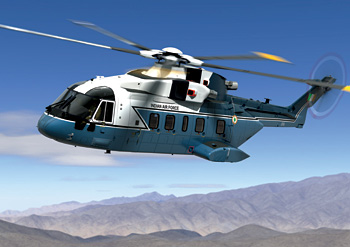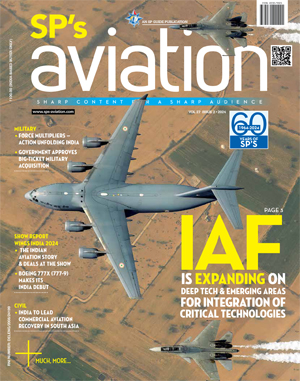INDIAN ARMED FORCES CHIEFS ON
OUR RELENTLESS AND FOCUSED PUBLISHING EFFORTS

SP Guide Publications puts forth a well compiled articulation of issues, pursuits and accomplishments of the Indian Army, over the years

I am confident that SP Guide Publications would continue to inform, inspire and influence.

My compliments to SP Guide Publications for informative and credible reportage on contemporary aerospace issues over the past six decades.
Cancellation is not the answer
In the procurement of defence equipment, allegations of wrong doing from dissatisfied vendors has become fairly routine.
 |
By Air Marshal B.K. Pandey (Retd) Former Air Officer Commanding-in-Chief of Training Command, IAF |
Media reports indicate that an Italian court that was dealing with the allegations of bribery by senior functionaries of Finmeccanica in the 3600 crore contract signed with the Indian Ministry of Defence (MOD) for the supply of 12, AW-101 AgustaWestland helicopters for VVIP travel, has delivered its final judgement in the case. In the 145-page document, the court has not only acquitted the top officials of AgustaWestland and Finmeccanica but also Air Chief Marshal SP Tyagi, former Chief of the Air Staff (CAS) of the Indian Air Force (IAF). The Indian Central Bureau of Investigation (CBI) that has been delving into the allegations of corruption against individuals suspected to be involved in wrongdoing including the former CAS, is yet to submit its final report. It is understood that the CBI has not been able to find incriminating evidence against the former CAS.

AW101
The sordid saga of the ill-fated deal began in February 2010 when the MOD concluded a contract with AgustaWestland, an Anglo-Italian company under the Finmeccanica, for the purchase of 12 AW-101 helicopters for the transportation of VVIPs. For flying VVIPs, the IAF had been operating MI-8 helicopters that had already been overtaken by obsolescence. The IAF had informed the MOD that the MI-8 helicopters would have to be retired from service in the near future after which it would not have any helicopter for VVIP flights. The case for procurement of new helicopters for VVIP use had therefore acquired a degree of urgency.
In February 2013, the deal was suddenly mired in controversy when the Italian authorities alleged that bribes were paid to Indian officials by the company to clinch the deal. Unfortunately, Air Chief Marshal SP Tyagi who had been the CAS when the tender was being processed, but had retired, was also dragged into the scam as one of the possible beneficiaries of the 360 crore kickbacks. The matter appeared extremely serious as the Italian authorities had arrested Giuseppe Orsi, CEO, Finmeccanica and Bruno Spagnolini, CEO, AgustaWestland. The day after the arrest of the two CEOs in Italy, AK Antony, the Minister of Defence, froze the contract and ordered investigation by the CBI into the allegations. Meanwhile, the Indian government had already paid 1600 crore and the IAF had received three of the 12 machines ordered.
Without waiting for the final report on the findings by the CBI or of the verdict of the Italian court, in January 2014, the MOD cancelled the contract on the grounds of "Breach of the Pre-Contract Integrity Pact and the agreement by AgustaWestland”.
The remarkably swift action by an otherwise lethargic government to cancel the contract with AgustaWestland merely on unsubstantiated reports of wrongdoing in the processing of contract, did signal the seriousness of the intent of the government to the global aerospace and defence industry that in the procurement of military hardware, India would not accept corrupt practices to secure defence contracts. While this action by the Defence Minister appeared ethically correct, it left the plans of the IAF for revamping the helicopter fleet for VVIP travel in disarray. The three AW-101 helicopters already received are of little use to the IAF as in the absence of product support from AgustaWestland, these machines can neither be used for VVIP travel nor for operational deployment. The IAF was left with no option but to divert six of the latest acquisitions of the MI-17 V5 from operational squadrons to be refitted for VVIP travel. Undoubtedly, this would have dented the operational potential of the rotary wing fleet of the IAF apart from the MOD saddled with a legal battle in Italian courts to recover the advance paid to the company.
The cancellation of the contract for the AgustaWestland helicopters is of little military significance per se as these machines were meant solely for the transportation of VVIPs and were not being procured for operational tasks. However, what is and ought to be a matter of concern is the callous disregard by the government for the deleterious impact of such ill-considered decisions on the operational potential of the armed forces. The UPA government had a particularly strong inclination for ordering investigations into processing of tenders or award of contracts for procurement of military hardware, blacklisting of firms and cancellation of contracts at the slightest hint of wrongdoing. During the UPA regime, a number of tenders were cancelled and firms blacklisted following allegations of wrongdoing. In the procurement of defence equipment, allegations by dissatisfied vendors of wrongdoing by the winner of the contract, have become fairly routine. Unless and until the MOD makes a clear distinction between “offence” and “contract” and deals with the former without jeopardising the latter, the armed forces cannot hope to achieve their targets for modernisation in the desired time frame.





